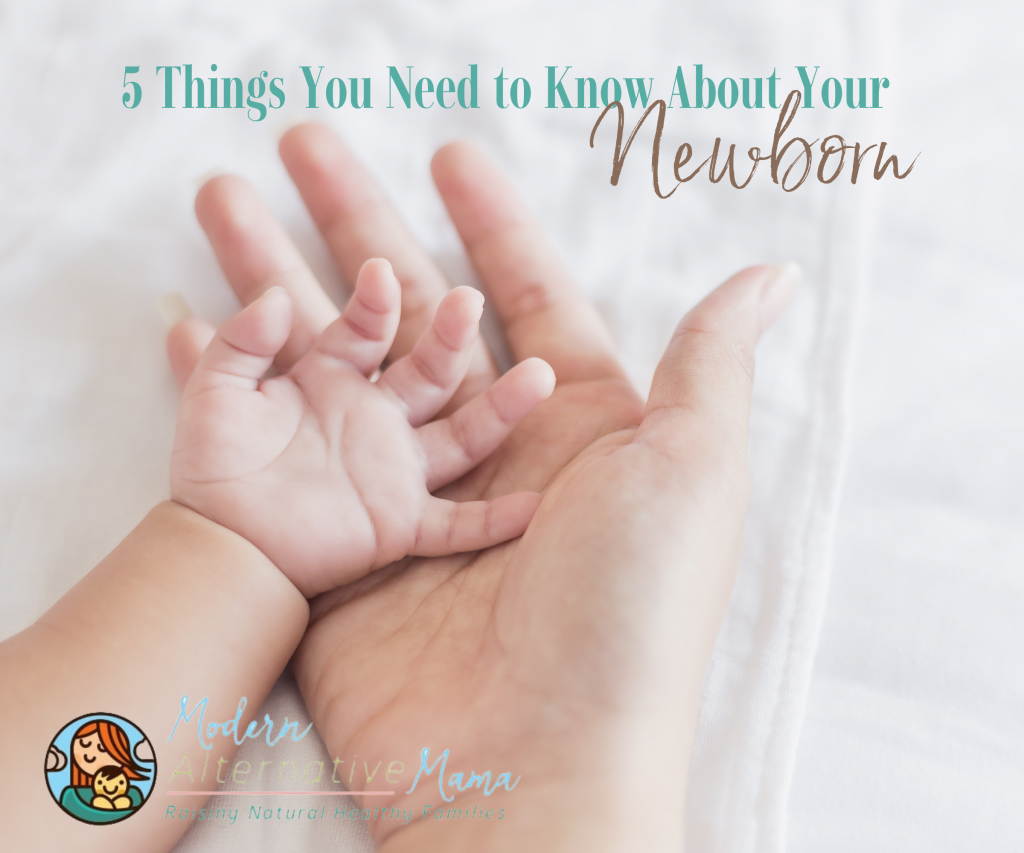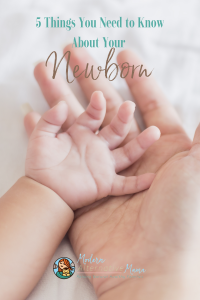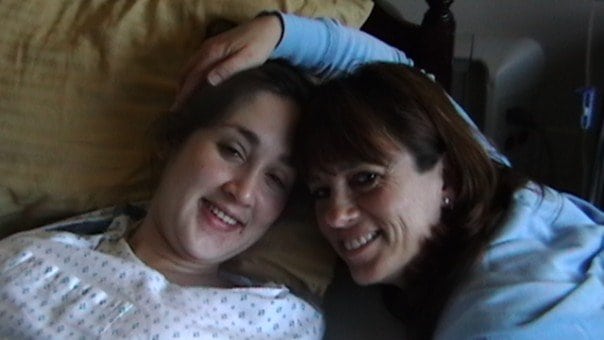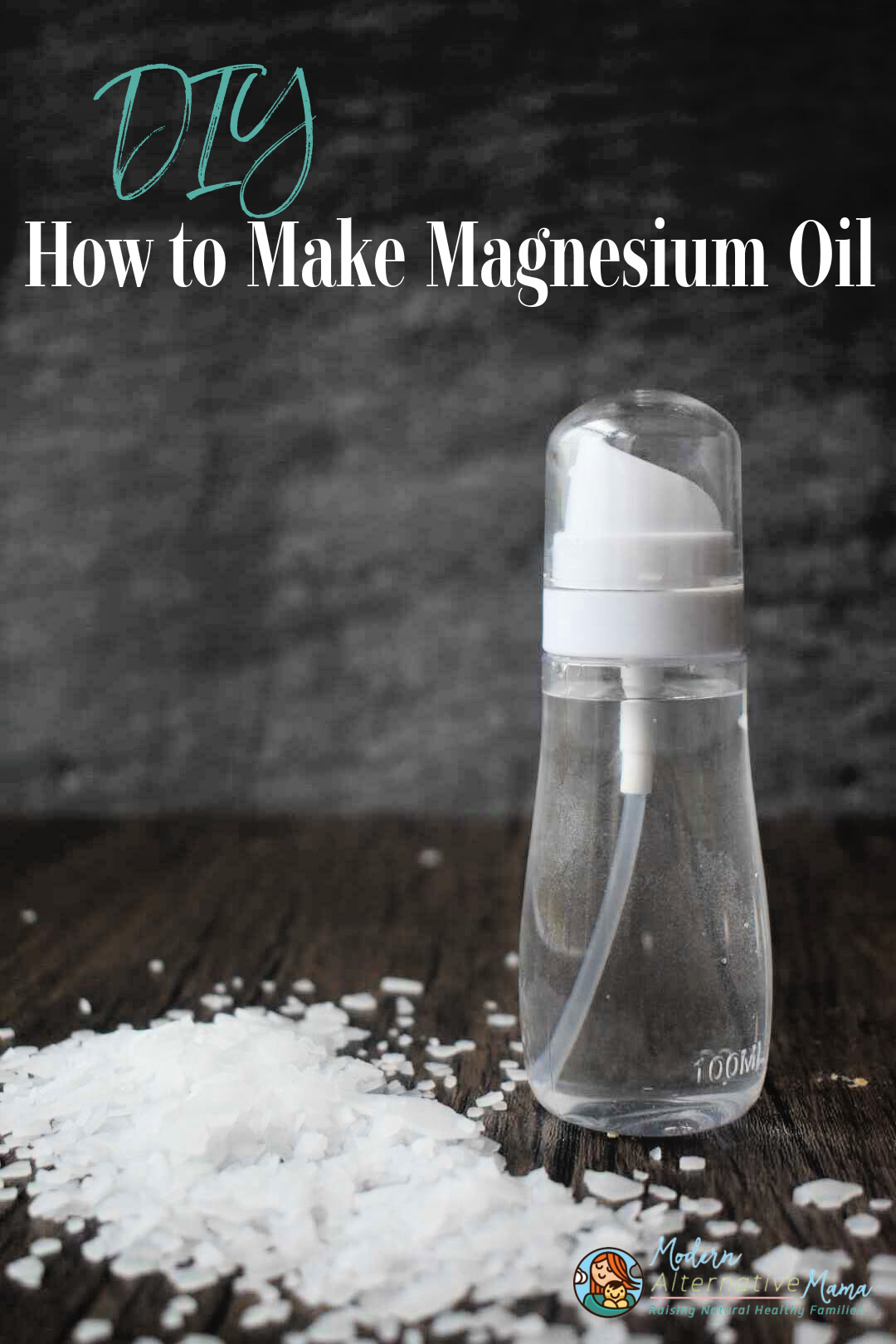When I brought my first baby home from the hospital, I knew absolutely nothing about babies.
Well, I knew they needed to eat often. I knew they needed to be changed often. And I knew they slept a lot. Anything else? Total mystery.
We got home late on a Sunday, around 10 PM. I changed the baby, nursed her to sleep, and set her in her bassinet. I knew that she would obviously wake in the night to eat, but I assumed that I’d have an hour or two before she needed me again.
I heard her cry before I even finished using the bathroom. Turns out she wasn’t so keen on being put down. (Turns out new babies in general aren’t so keen on that, I now know — I’ve had five babies.) I wasn’t sure what to do. I needed to eat, and I needed to sleep, but my baby didn’t seem to want to give me 10 minutes to do any of this!
My husband and I took turns holding her and eating and sleeping for the next several days. We eventually settled in and figured things out. We learned so much in that first year, and even more with every baby. As seasoned parents now, there’s not much a baby can throw at us that we haven’t seen before.
When you’re a first-time parent, there’s a lot to learn. Been there, done that. Now it’s time to share my knowledge!
5 Things You Need to Know About Your Newborn
1. Breastfeeding Is Best, But It Isn’t Always Easy
Breastfeeding is the biologically normal way to feed babies. Breast milk is so much more than food. It is filled with growth hormones, stem cells (so is your baby’s cord blood — your baby needs a lot of stem cells in the early months when they are growing rapidly!), immune factors, probiotics, and more. It is your baby’s immune system. It literally builds your baby’s body.
But that doesn’t mean breastfeeding is easy.
Most babies need 5 -7 days to figure out how breastfeeding works. That’s 5-7 days if you know what’s going on. With my first baby, I had no clue and struggled for 6 weeks. My second baby was a freak of nature who latched on at birth and never had an issue. Babies 3-5 needed that 5-7 day period to figure out how to latch correctly, every time. (They tended to latch too shallowly if they were very sleepy.) But by then I knew what to do, so I taught them.
Get some help if you need it. This is common for most babies, and it doesn’t mean there is anything wrong with your baby, or that you are not ‘in tune’ enough, or any such nonsense. Visit a lactation consultant, ask an experienced friend, whatever you need to do. And be patient — your baby will soon learn to breastfeed and latch correctly all the time.
Find answers in When Nursing Hurts so Bad You Want to Cry (How to Get Help).
2. Your Newborn Will Need a Lot of Diapers (or Not)
The average newborn will go through 8-12 diapers per day, at least after the first week. Brand new babies only pee 1 – 3 times per day in the first few days, and it increases by about 1 time for everyday they are old (so 5 times on day 5, etc.). The same is true for poop in many cases. That’s because their bodies are still clearing meconium, and they are not eating very much yet. Once mama’s milk is in, then all bets are off.
Cloth diapers are an excellent solution for many families, because they come in all shapes, sizes, and colors and they are very affordable. The average cloth diaper stash for one baby costs between $200 and $500 depending on type, but it can last through 3 – 4 babies easily. The average cost of using disposables on one baby is about $2000, and you have to buy new for each one, of course.
We choose to use a hybrid — we used cloth diapers during the day, and we used disposables at night. We used to only use cloth, but my babies woke up because they were wet until they potty trained – even long after they night-weaned. I like sleep, so compromising worked best for us.!
Of course, some mamas actually don’t use diapers for their babies very much at all. Instead, they use a method called EC, or Elimination Communication. That’s where the mamas notice baby’s cues when they need to go, hold them over a sink or potty bowl and let them go. Most use some kind of hissing sound, or another ‘cue’ to help tell the baby when it’s okay to go. A lot of these babies become ‘trained’ enough by 9 – 12 months of age that they can use baby sign language or a hissing sound to tell mama when they need to go!
3. Your Newborn Wants to Be Held – A Lot
Before your baby arrived, s/he was held 24 hours a day, inside your body. That is what s/he is used to. And, biologically, that is the safest thing. Human babies are born quite immature, and are unable to do anything for themselves. Without an adult to hold them, keep them warm, feed them, change them, etc. they will die relatively quickly.
So, it makes sense that they want to be held a lot. It’s how they ensure their needs will be met and they will survive and thrive.
In fact, babies who are held close to their mothers sleep more peacefully, regulate their body temperature more easily, breathe more easily, and even grow better.
If you hold your baby 18 hours a day, and set him/her down for 6, that is a 25% reduction in holding time — that’s a lot, from baby’s perspective!
To make things easier, ask for help. In the early weeks, you need to rest and recuperate anyway. Have friends or family come over and help make meals, do laundry, or dishes. Spend time sitting in bed or on the couch and snuggling your baby.
When you need to get up, use a quality baby carrier to keep your baby close and your hands free. A Moby wrap is a favorite of many mamas. Carriers like Boba, Beco, Tula, LilleBaby, and others are nice when baby is a little bit bigger (though most can hold newborns if needed — a lot of newborns don’t feel secure when they are still very small and floppy though).
4. Your Newborn Can Sleep Well, From Birth…With Your Help
This is much longer than this post will allow, but it’s an important point. We think of newborns as terrible sleepers, but they aren’t. I learned how to help my babies sleep well from birth, and tried my “theories” on my fifth baby last summer — it worked.
Involving your baby in the family’s routine is important. Keeping baby close to you at night is important (whether in your bed or in their own bed near you). Making a difference between ‘day time’ and ‘night time’ sleep helps as well. (Day time is light and napping whenever; night time is quiet and dark.)
Having realistic expectations helps a lot as well — your baby will wake to eat a lot. (It’s why we co-sleep and I help baby learn to latch side-lying pretty quickly. After only a few weeks, baby indicates that he wants to nurse by turning his whole body towards me and nuzzling silently. No need to cry because I am right there. Neither of us really wake up. Which means mama isn’t sleep deprived!)
Follow your baby’s cues, too. When s/he yawns or fusses or looks sleepy, help him/her fall asleep. Do it in a variety of different ways. (While nursing, over your shoulder, snuggled and rocking, etc.) Very soon your baby will develop his/her own routine and you just need to go with it. I promise that it works — even though it won’t look like the mainstream books say it should. (i.e. your baby will not sleep an uninterrupted 10 – 12 hour night in a separate room. But s/he shouldn’t in the early months anyway.)
Read more in Why I Hope My Newborn Sleeps Through the Night.
5. Your Newborn Doesn’t Need Other Food…and Won’t For Awhile
In some circles, it’s quite common to start feeding babies some kind of food, often rice cereal, as young as two weeks. But please don’t do this. Your baby’s gut is immature, and not ready for anything but breastmilk until at or after 6 months, in most cases. (I fed my first at 4 months because I didn’t know any better; my second was very interested at 6 months; my third suddenly developed interest around 7.5 – 8 months; my fourth was not interested at all until past 10 months, and barely ate until 14 – 15 months; my fifth is not interested yet at 6 months.)
When your baby is ready to eat, you’ll see signs like sitting unsupported (totally independently), having teeth, and being able to pick up food by him or herself. Even if all these signs are present, your baby still may not be ready! My 6-month-old has been able to sit alone since before 5 months, can pick up food, and has a tooth and does not seem interested in food.
Eventually that time will come. When it does, nourishing and healthy homemade foods are the best options. Avocados, sweet potatoes, fruit purees, liver, and more.
Learn more in 10 Super Starter Purees for Baby and Nourished Baby.
More Resources
Earthley’s Pregnancy and Baby Categories
Mama and Baby Herbal Wisdom eBook
A Mother’s Guide to Breastfeeding Nutrition
When Nursing Hurts so Bad You Want to Cry (How to Get Help)
What I Learned Breastfeeding For Over A Decade (and How It Felt)
Practicing Essential Oil Safety While Breastfeeding
“But You Can’t DO THAT!” (and Other Breastfeeding Myths)
What I Should Have Done (and a Postpartum Hydrating Recipe)
5 Herbs to Increase Milk Supply
The 5 Key Nutrients that Promote Quality Sleep
7 Surprising Reasons Kids Don’t Sleep Well
Why You Shouldn’t Sleep Train Your Baby
5 Reasons You Should Cosleep With Your Newborn







